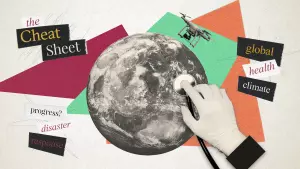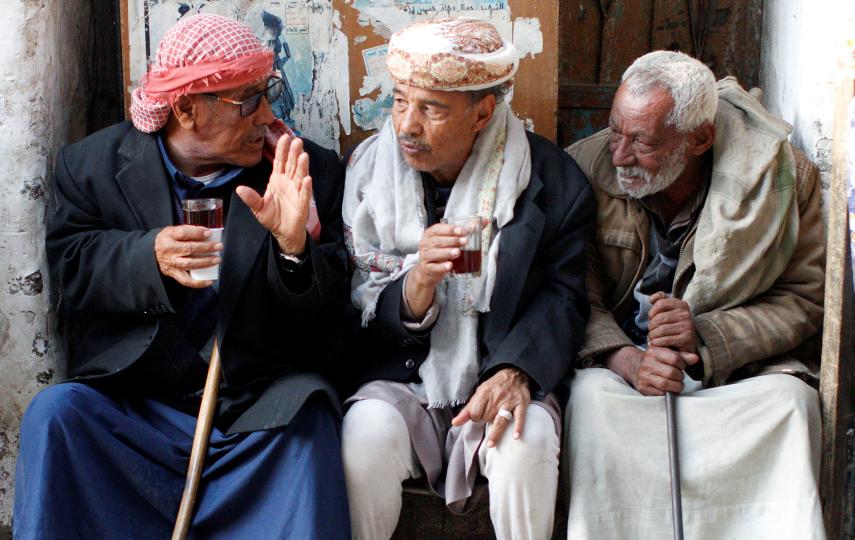Most aid agencies are set up to provide direct help to people affected by crises: food, shelter, healthcare, and other assistance. But a growing number of humanitarian organisations now focus on helping the frontline – and better known – aid providers to improve their work.
These groups offer everything from real-time mapping services to allow aid to reach disaster-affected communities more quickly, to negotiation skills that can come in handy when navigating access with governments or militias.
While Humanitarian to Humanitarian (H2H) organisations – akin to the private sector term “B2B” – have existed in some form for decades, Kim Scriven, executive director of the H2H Network, told The New Humanitarian they have now “grown in scale and prominence”.
“These H2H organisations have played a really important part in conversations about reform and improvements in the humanitarian system.”
Over the years, aid has become more professionalised and funding has become concentrated into a smaller number of organisations. Instead of having small charities with narrow remits, fewer organisations today are handling much wider portfolios. In turn, they have become more reliant on support from outside specialists.
“These [H2H organisations have] played a really important part in conversations about reform and improvements in the humanitarian system,” Scriven said.
“Often… we talk about system change in terms of… big heavy policy processes. H2H actors provide an important counterpoint to that,” he added. “They’re in the system but at the edge of it, able to demonstrate different [kinds of] change.”
There are a plethora of these specialised NGOs out there, so it would be impossible to cover them all. Here’s just a sampling of some – many of them gathered under the H2H umbrella network – that are working to improve aid but often fly under the radar.
(The New Humanitarian is a member of the H2H Network and our CEO, Heba Aly, chairs its board of directors.)
Real-time mapping
After a humanitarian disaster, responses can often be slowed down by a lack of geographical information. Which roads are open? Which communities are affected? How can responders reach them quickly and safely? Refugee camps or informal settlements are rarely mapped, making it difficult to understand what services are needed where.
“Missing maps can result in aid not reaching communities affected by disasters,” Gihan Hassanein, from Humanitarian OpenStreetMap Team (HOT), told The New Humanitarian.
Without detailed and frequently updated maps after the 2010 Haiti earthquake, it was difficult to know where needs were unmet. HOT got its start there, rolling out open source maps that could be instantly adjusted by aid providers. The group now operates in 85 countries, working on everything from disaster risk reduction to better waste management, from poverty elimination to public health.
Demand has been so great that HOT is not the only shop on the block improving aid through robust mapping. Other groups like MapAction, iMMAP, CartONG, are now doing the same.
Training up to negotiate
Negotiation is a core part of a humanitarian’s job. This can involve a range of actors – government authorities, armed forces, community leaders – and be focused on everything from access, to protection and rights, to service delivery. But training for it is hard to come by.
Launched in 2016, the Centre of Competence on Humanitarian Negotiation (CCHN), an International Committee of the Red Cross-hosted, inter-agency partnership helps humanitarian workers “prepare for and manage field negotiations more systematically,” said Barbara Sartore, the group’s head of communication.
Run in partnership, CCHN provides free, online negotiation training in multiple languages to aid workers. The forum allows for “a safe, informal, confidential, and neutral space to develop their negotiation skills, share their expertise with other humanitarian negotiators, and learn from each other's experiences,” Sartore said.
More than 4,000 humanitarian workers globally have received CCHN training.
While CCHN focuses on the art of negotiation, other organisations tackle a range of training needs. For example, the Humanitarian Leadership Academy offers aid workers around the globe free “context-specific and locally relevant” online courses on safety and security, and other topics; while RedR UK trains thousands each year in efforts to improve disaster relief.
Managing data
When data scientist Ewan Oglethorpe arrived in Nepal to help out in the wake of the 2015 earthquake, he quickly recognised humanitarians’ deficiency when it came to digital capacity and data management. That’s why Oglethorpe founded Data Friendly Space, a group dedicated to making aid groups better equipped to handle data strategy* and, as he described it, ensuring they are “self-sustainable, with robust information and digital systems”.
Today, DFS consults with hundreds of partners, including UN agencies, aid donors, and the Red Cross.
Other data-centric outfits, like Evidence Aid, take a different tack, collecting and collating the latest research evidence to help drive better-informed humanitarian response.
Another, the Data Entry and Exploration Platform (DEEP), created in partnership with DFS, provides humanitarian groups access to a range of unstructured qualitative data, ranging from risk analysis, to media monitoring, to operational workflows.
“It helps prioritise needs through identifying issues, vulnerable groups, and geographic areas, hence supporting people in most severe needs across humanitarian contexts,” DEEP manager Cecilia Utas explained.
Increasing accountability
Severiyos Aydin had a career in the private sector before starting an NGO that provides assistance to people displaced by conflict in the Middle East and Africa.
“I encountered many of the inefficiencies and problems that challenge our sector, and I felt that more could be done to address them with new technologies,” he told The New Humanitarian.
In 2018, Aydin founded Aidonic, which bills itself as a “blockchain solution for social fundraising and last mile aid distribution”. Blockchain allows aid organisations to digitally manage and trace their cash assistance, and donors to follow their donations right through to distribution.
It also offers improved accountability to the end recipients who can “interact with the aid provider to express their capacities and needs, all the while providing a real-time, immutable record of service delivery”, Aydin explained.
Other organisations are hoping to tackle more visible impacts of misdirected aid. RightBoot – which is not yet operational – aims to streamline humanitarian aid by avoiding or repurposing unwanted and unneeded donations, which can often overwhelm a disaster-struck community.
“By removing the burden of waste and arming… people with the knowledge and capabilities to manage waste in a circular way, I hope to hand much more control back to the community recovering from disaster,” founder Travis Opocensky told The New Humanitarian.
*An earlier version of this piece mischaracterized Data Friendly Space's main specialization.
Edited by Jessica Alexander.









